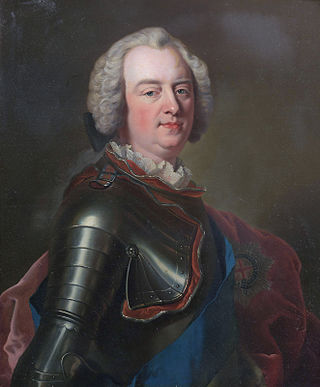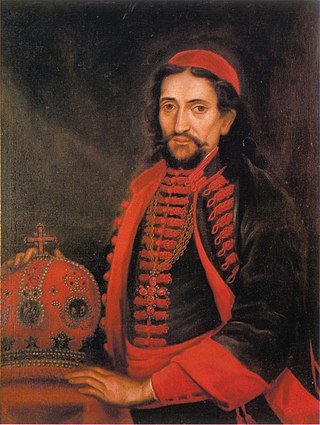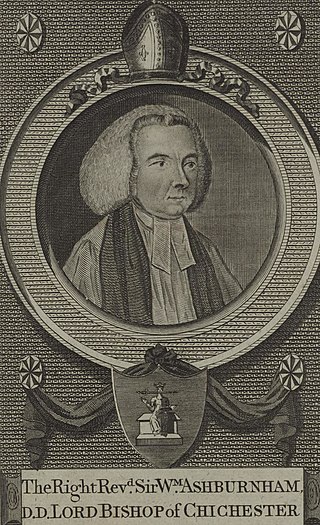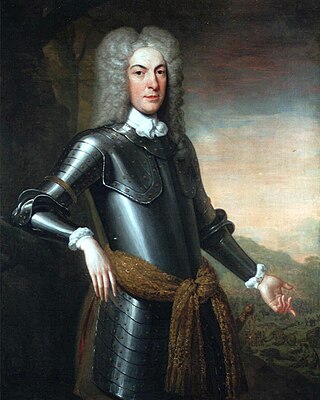
The Treaty of Belgrade, also known as the Belgrade Peace, was the peace treaty signed on September 18, 1739 in Belgrade, Habsburg Kingdom of Serbia, by the Ottoman Empire on one side and the Habsburg monarchy on the other, that ended the Austro–Turkish War (1737–39).

Richard Turpin was an English highwayman whose exploits were romanticised following his execution in York for horse theft. Turpin may have followed his father's trade as a butcher early in his life but, by the early 1730s, he had joined a gang of deer thieves and, later, became a poacher, burglar, horse thief and killer. He is also known for a fictional 200-mile (320 km) overnight ride from London to York on his horse Black Bess, a story that was made famous by the Victorian novelist William Harrison Ainsworth almost 100 years after Turpin's death.

Field Marshal Sir Robert Rich, 4th Baronet was a British cavalry officer. As a junior officer he fought at the Battle of Schellenberg and at the Battle of Blenheim during the War of the Spanish Succession. He was then asked to raise a regiment to combat the threat from the Jacobite rising of 1715. He also served with the Pragmatic Army under the Earl of Stair at the Battle of Dettingen during the War of the Austrian Succession. As a Member of Parliament he represented three different constituencies but never attained political office.

Marquess of Donegall is a title in the Peerage of Ireland held by the head of the Chichester family, originally from Devon, England. Sir John Chichester sat as a Member of Parliament and was High Sheriff of Devon in 1557. One of his sons, Sir Arthur Chichester, was Lord Deputy of Ireland from 1605 to 1616. In 1613, he was raised to the Peerage of Ireland as Baron Chichester, of Belfast in County Antrim. He died childless in 1625 when the barony became extinct.
The Russo-Turkish War of 1735–1739 between Russia and the Ottoman Empire was caused by the Ottoman Empire's war with Persia and continuing raids by the Crimean Tatars. The war also represented Russia's continuing struggle for access to the Black Sea. In 1737, the Habsburg monarchy joined the war on Russia's side, known in historiography as the Austro-Turkish War of 1737–1739.
Robert Byng (1703–1740) was a British Navy official and Whig politician who sat in the House of Commons from 1728 to 1739. He served as Governor of Barbados for a short time before he died there.

Charles Lennox, 2nd Duke of Richmond, 2nd Duke of Lennox, 2nd Duke of Aubigny, of Goodwood House near Chichester in Sussex, was a British nobleman and politician. He was the son of Charles Lennox, 1st Duke of Richmond, 1st Duke of Lennox, the youngest of the seven illegitimate sons of King Charles II. He was the most important of the early patrons of the game of cricket and did much to help its evolution from village cricket to first-class cricket.
Paul Richard (1667–1756) was the 37th Mayor of New York City from 1735 to 1739. Paul Richard was one of the most prominent merchants and citizens of New York, and Mayor of the City in 1735-1739. His remains were buried in Trinity Church under the chancel, which in the ancient edifice was at the east end of the building. In digging for the foundations of the present church, in 1839, the broken fragments of the tombstone of Paul Richard were discovered. He was also a Governor of Kings College, now Columbia University, and was elected to the General Assembly.
Simeon Strong (1735–1805) was a justice of the Massachusetts Supreme Judicial Court.
Treaty of Constantinople was a treaty between Ottoman Empire and Afsharid Iran signed on 24 September 1736, ending the Ottoman-Persian War(1730-1735)
Ivaz Mehmed Pasha, also known as Hacı Ivaz Mehmed Pasha or Hacı Ivazzade Mehmed Pasha, was an 18th-century Ottoman grand vizier and provincial governor.

Vikentije Jovanović was the Serbian Orthodox Metropolitan of Belgrade and Karlovci from 1731 to 1737, as Vikentije II. During his diplomatic mission in Vienna in 1734, he was given permission by Emperor Charles VI to establish a hussar regiment constituted solely of Serbs and Croats. It was officially named Illyrian-Rascian regiment and inaugurated on 16 June 1735 in a grand ceremony officiated by Vikentije. The ceremony took place outside Budim where the banners which were used symbolized his importance in the Austrian Empire, but also the dual symbolism of East and West; dual coats of arms on their spears, two languages in their inscriptions, and the use of Eastern iconography and Western emblematic imagery. Vikentije's hussars went on to fight in the Austro-Russian–Turkish War (1735-1739).
The Venerable Thomas Ball was the son of Lawrence Ball, of Eccleston, Lancashire, and a Church of England clergyman.

Sir William Ashburnham, 4th Baronet was a Church of England priest and also a baronet.
James Hargraves or Hargrave (1690–1741) was an English Anglican divine who became the Dean of Chichester Cathedral in 1739.
Francis Columbine was a British Army officer and Governor of Gibraltar.
John Newey was an English churchman, Dean of Chichester from 1727 to 1735.

Events from the year 1739 in Russia
Textual variants in the Second Epistle of John are the subject of the study called textual criticism of the New Testament. Textual variants in manuscripts arise when a copyist makes deliberate or inadvertent alterations to a text that is being reproduced. An abbreviated list of textual variants in this particular book is given in this article below.

General Charles James Otway was an eighteenth century senior commander in the British Army.








